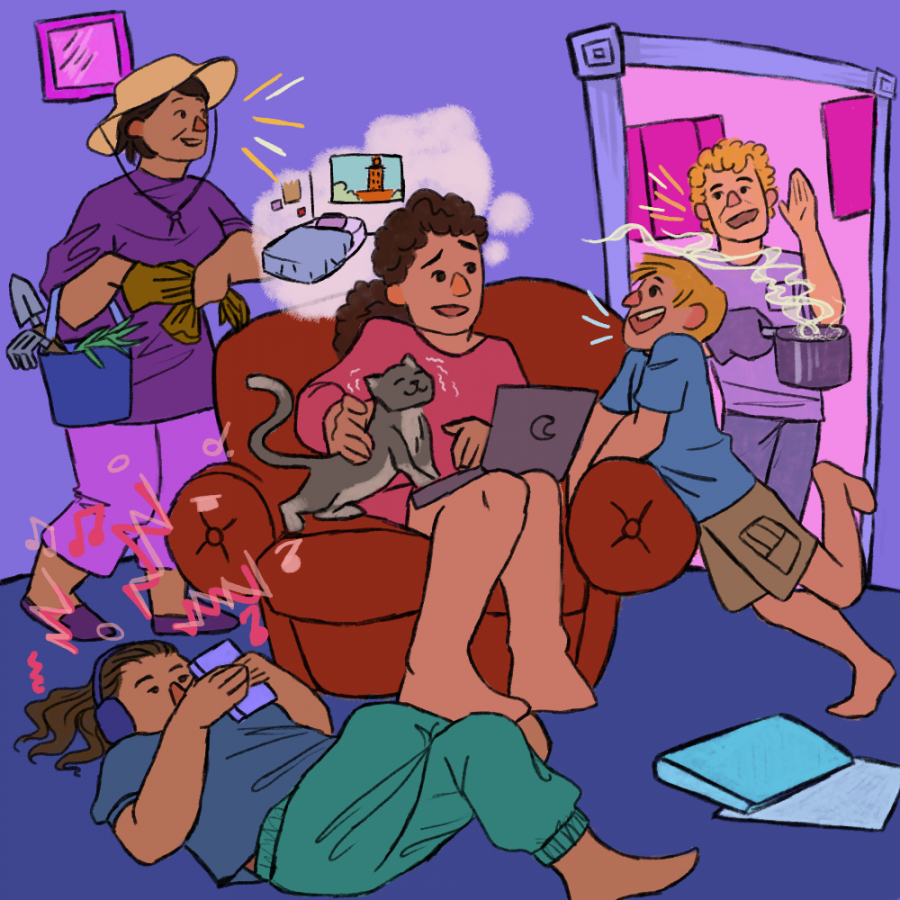Never left home: Students describe ‘mentally draining’ nature of living at childhood homes
April 6, 2021
Editor’s Note: This article first appeared in the April 2 issue of The Daily Texan.
At 8 a.m. everyday, Carolina Cruz wakes up to her younger sister’s alarm blaring.
Her sister is in high school and begins class hours before Cruz even gets ready for her first college course of the day. From the early hours of the morning until mid-afternoon, Cruz said she’s “kicked out” of the bedroom they share.
“We live two completely different lives,” journalism sophomore Cruz said. “We get into fights almost every day. And we’re not really fighting, but we’re just annoyed with each other’s presence.”
For Cruz and many other students, the “leaving home” part of growing up hasn’t happened. The traditional college experience has been confined to students’ childhood homes as a result of the COVID-19 pandemic and remote learning.
“It’s mentally draining because even though we’re in the pandemic, I see my friends in Austin being able to hang out,” Cruz said. “For me, I literally wake up, walk 10 steps to my little schoolroom and that’s the extent of my UT experience, so it’s really sad.”
When Cruz decided to transfer from Texas A&M International University after her freshman year, she said she imagined herself living in Austin. Over a year since her acceptance, she said she still lives in her family’s home in Laredo, Texas.
Psychology and linguistics freshman Sophia Boyd said living with her parents has hampered her independence, because they can be “a bit coddling.”
“My parents will try to be super supportive of (my independence), like ‘Woohoo, go and do things on your own,’” Boyd said. “But still, at the end of the day, I have to return home and be a semi-kid.”
Some older students expressed the same sentiment after returning to live with their family when the COVID-19 shutdown began in March 2020.
Early childhood education sophomore Tess Covey, who lives in El Paso, Texas, with her parents and younger sister, said she has been “homebound” since she moved from Jester East Residence Hall over a year ago.
“It’s been nice to be with family,” Covey said. “Our relationship has grown this entire pandemic since we have been home for so long. We’ve had no choice but to get along because it gets lonely if you’re in your room all the time.”
Although she said she has strengthened bonds with family, Covey said there are times when she “goes crazy” in isolation. When that happens, she said she drives around to get out of the house and grab a coffee or meal on her own.
“I have developed such an appreciation for FaceTime,” Covey said. “A coping mechanism of mine is to call my friend who goes to Texas Tech (University). It brings a sense of normalcy because it feels like she’s right in front of me.”
Like Boyd and Covey, Cruz said she has joined remote student organizations to feel more attached to the UT community.
“I’ve made probably two friends this entire year,” Cruz said. “It’s kind of hard to reach out to people through Zoom. How do you even do that? I don’t know.”
Despite a general sense of gloom, students express optimism as the University plans a “near-normal” fall 2021 semester on campus.
“I’m having to figure out (campus life) far later than a lot of people, but at the same time, a lot of us are dealing with that, so it’s not as bad,” Boyd said. “We have each other’s backs in the sense that a lot of us are gonna be struggling.”



